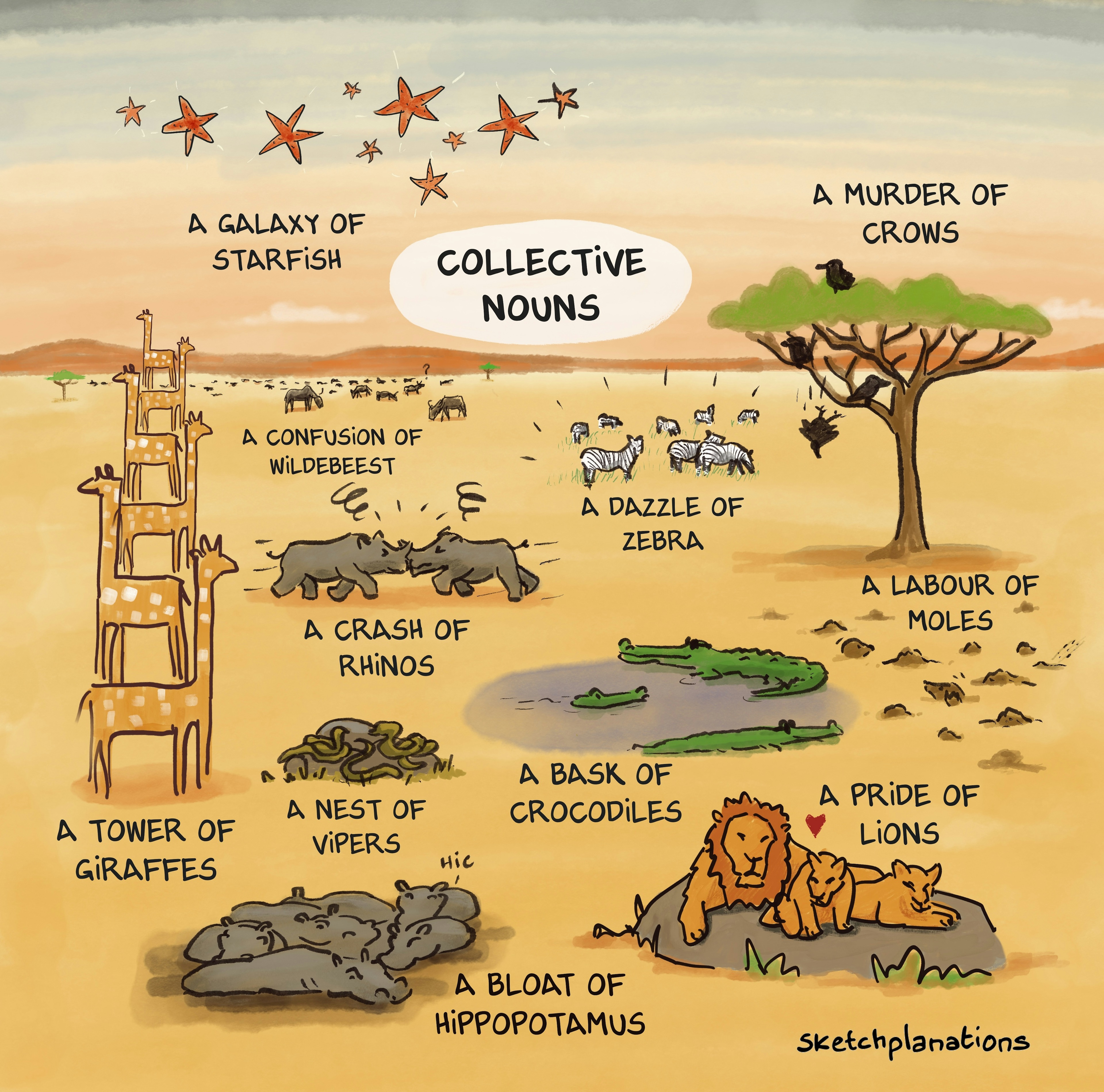Collective Nouns: Examples, meanings, and the best ones for animals

👇 Get new sketches each week
A tower of giraffes.
A murder of crows.
A shiver of sharks.
Some of the most delightful words in English are collective nouns.
A collective noun is a word used to describe a group of individuals or things — most commonly groups of animals. The best capture character and imagination in a single word.
Watch a replay of drawing this sketch
Everyone loves a good collective noun. So here's a small collective nouns list with some of the most delightful examples.
Fun Examples of Collective Nouns for Animals
Some crackers:
- A tower of giraffes
- A crash of rhinos
- A galaxy of starfish
- A shiver of sharks
- A destruction of wildcats
- A bask of crocodiles
- A pride of lions
- A bloat of hippopotamus
- A nest of vipers
- A confusion of wildebeests
- A shrewdness of apes
- A dazzle (or zeal) of zebra
- A labour of moles
- A prickle of porcupines
- An embarrassment of pandas
- A skulk of foxes
- A leap of leopards
Collective Nouns for Birds
We all know a gaggle of geese, thanks to the great alliteration, but these are lovely too:
- A parliament of owls
- A murmuration of starlings
- A charm of goldfinches
- A pandemonium of parrots
- An ostentation of peacocks
- An exaltation of larks
- A flamboyance of flamingos
- A murder of crows
- A deceit of lapwings (poor lapwings)
- An exaltation of larks
- A raft of coots
Collective nouns for other things
Are collective nouns for other things, not just animals? Yes. We say a bunch of bananas, a quiver of arrows, a bouquet of flowers, a fleet of ships, or a squadron of aircraft.
Collective nouns for professions or groups of people are some of the more fun. Take, for example:
- a pack of thieves
- a coven of witches
- a haggle of vendors
- a sentence of judges
- a flock of tourists
- a wince of dentists
- an absence of professors
- a tangle of coat hangers
- or a torment of personal trainers
Collective nouns are everywhere.
Where do collective nouns come from?
Many collective nouns still used today were first recorded in a 1486 book by an English noblewoman called The Book of St Albans , or The Book of Hawking, Hunting and Blasing of Arms. It includes an appendix in wonderful olde englishe with "The Compaẏnẏs of beestẏs and fowlẏs." It meant that people out hunting could correctly identify their "Besynes of ferettis" (business of ferrets) and "Brace of grehoundis" (brace of greyhounds).
But English continues to evolve, and the older zeal of zebra may give way to a dazzle when enough people decide to use that one. As there appears to be no established authority, may the best collective noun win.
Wiktionary has a mighty list of collective nouns in case you ever wanted to discover a glitter of generals, an implausibility of gnus, or a helix of geneticists. I can't vouch for their accuracy, though. If you know or find any others you particularly like, please share them with me in a reply or comment.
However, the best and most well-researched collection I’ve seen is from James Lipton’s An Exaltation of Larks .
What makes a great collective noun?
For me, the best collective nouns sum up, often with a touch of humour, poetry, and perhaps a wink, the most salient qualities of their nouns. It’s what makes a shiver of sharks, or a bask of crocodiles, so much more enjoyable than, say, a cloud of sharks, or a litter of crocodiles, or just a bunch of either of them.
Perhaps we need a collective noun for a group of sketches?
- A gallery of sketches
- An insight of sketches
- A clarity of sketches
- A spark of sketches
- A scribble of sketches
- A wonder of sketches
Favourites?
Related Ideas to Collective Nouns
Also see:
- Spoonerism
- Dialogue, monologue, halfalogue
- Days of the week
- Ordering adjectives
- Sea jelly, sea star
- Crazy English: fish - ghoti
- Word spectrum
- RAS Syndrome
- Advise vs advice
- NATO Phonetic alphabet
Learn more:
A short BBC video, The Strange World of Collective Nouns , gives a lovely overview of their origin and some fun examples. A pedant of Oxford commas? As Susie Dent says, "The only boring thing about collective nouns is their name."
Update 10 Nov 2025: I added a few more from suggestions and a link to the excellent book An Exaltation of Larks .

